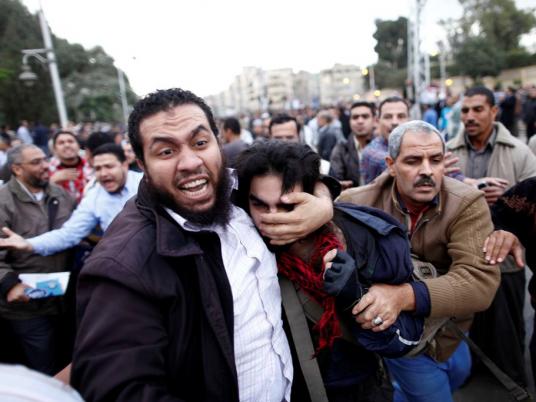
In a mounting war of narratives between the Muslim Brotherhood and the opposition to President Mohamed Morsy, activists exposed incidents of abduction and torture at the hands of Brotherhood followers during a press conference Wednesday, titled “Testimonies from Ettehadiya.”
Opposition protesters recounted the violent events that erupted on 5 December when the president’s Islamist supporters descended on their sit-in outside the presidential palace against Morsy’s decisions.
“They stood on my face and bounced on my chest,” said Yehia Zakaria Negm, a former diplomat who resigned in 2005 and one of the captives taken by Muslim Brotherhood supporters during the bloody clashes. He said Muslim Brotherhood doctors refused to give him medical care and told him they were prohibited by the supreme guide from attending to him.
“The female doctor kicked me several times in the back,” he said.
Ola Shahba, a member of the Socialist Popular Alliance Party, said she was also abducted along with her colleague Ramy Sabry during the clashes, sexually assaulted and kept at a kiosk by one of the palace gates.
“I was asked about the embassy I work with and the money I receive from foreign entities,” explained the young woman, who said Brotherhood supporters accused her of carrying bottles of Molotov cocktails.
“The police and the Central Security Forces supervised and blessed the abduction of civilians by other civilians,” she added.
Activist Shady Basyouni was held in captivity for two days until he was released by his unknown kidnappers.
“After being drugged, I woke up in a tent gagged and handcuffed,” explained Basyouni, who said he was blindfolded at all times but was allowed to send some messages.
“I sent a message to [activist] Mona Seif and to my best friend to let them know I was kidnapped.” On Friday, Basyouni was taken to Falaki Square and was told to walk straight forward and not look behind him after the blindfold was removed.
Most of the detainees were stripped of their belongings, cell phones and clothing and were help in captivity in their underwear. Many were injured and stabbed during the clashes. Shady Hussein, a 19-year-old student, had 106 birdshot pellets in his body. Hussein was refused by five hospitals before he was finally treated at Al-Oyoun International Hospital.
“I still have two pellets inside my left eye a millimeter away from the nerve,” he said.
Muslim Brotherhood officials repeatedly denied these allegations to the media. In a recent report by the New York Times, senior Brotherhood leader Gehad al-Haddad insisted that “thugs” and “third party” individuals infiltrated both camps and caused the bloodshed.
Key speakers during the opposition press conference declared that many of those tortured or detained are now being contacted by authorities investigating the incidents.
After having released all those arrested following the clashes, East Cairo Prosecution head Mostafa Khater was transferred to the significantly quieter city of Beni Suef by Prosecutor General Talaat Abdallah, who was appointed by Morsy in late November to replace Mubarak-era appointee Abdel Meguid Mahmoud. The move was condemned as an interference from the president in judicial affairs, as the executive office traditionally does not have the power to remove judicial authorities by decree.
Khater’s transfer was reversed after a number of prosecutors threatened to strike in response to Abdallah’s decision.
As the press conference was unfolding inside the Journalists Syndicate, outside its gates, hundreds of journalists and activists gathered to mourn the death of Al-Fagr photojournalist Al-Husseini Abu Deif. Abu Deif was shot in the head during the clashes and died a week later on Wednesday from his injuries. The crowd chanted and called for justice and a death sentence for the president. Many of them were crying as they held posters of their colleague.
The death of Abu Deif has also been a subject of contested narratives.
On Wednesday, the Freedom and Justice website accused the National Salvation Front, an ad-hoc coalition of opposition groups, of killing Abu Deif. They also claimed that the photojournalist was present amid the ranks of the Brotherhood when he was shot from the opponents’ side.
In response, Mona Seif compiled a series of tweets by Abu Deif before he went to the clashes. One of his tweets, posted as screenshots on a Facebook note, read, “To each revolutionary defending the truth, if you find a Muslim Brother raising a knife or a gun in your face, telling you that you are an apostate, respond by saying ‘God is great and the revolution is bigger than your gang.’”




